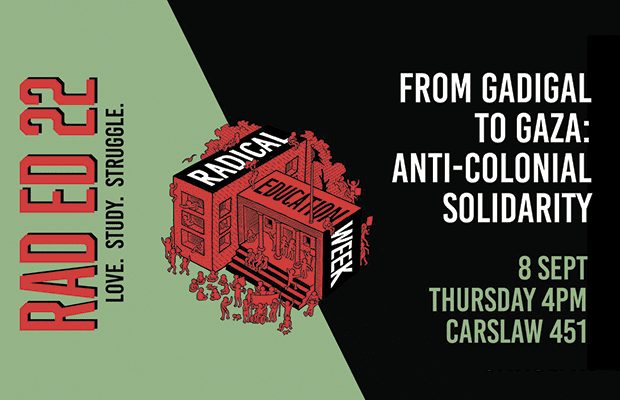Following recent escalation in the Israel-Palestine conflict – characterised by the former’s settler-colonial aggression in Gaza, the West Bank, and East Jerusalem – last Thursday’s contribution to the SRC’s Radical Education (Rad Ed) thought critically about Australia’s role in the international response to the Palestinian struggle, exploring the parallels between the historical plights of displaced Palestinians and First Nations’ Australians. Panellists also discussed the importance of student activism in decolonising universities.
Hosted by SRC General Secretary Alana Ramshaw, the panel consisted of Palestinian activist and UNSW organiser Amal Naser, and Wiradjuri Wailwan activist and incoming Honi editor Ethan Floyd.
After brief introductions, Ramshaw kicked off the session by asking the panel, “What does Indigenous advocacy look like and mean to you? Do we have a mandate to oppose settler-colonialism around the world, particularly in Palestine?”
Floyd began the discussion by describing his experience with First Nations advocacy.
“It [First Nations activism] takes many forms. It’s about reforming the curriculum and making universities culturally safe spaces. It’s about land and property rights, and it’s also about addressing some systemic disparities in areas of health and justice.”
He also laid out what he sees as the mandate First Nations peoples have to oppose settler-colonialism, both domestically and internationally.
“We [First Nations’ peoples] … should feel an overwhelming obligation to get involved. We should know better, from our own experiences with colonisation and displacement.”
Floyd was critical of the Australian government’s response to the Palestinian crisis, saying he is “continually embarrassed by the conduct of the Australian government at the United Nations Human Rights Council and the Security Council”.
“In the short term, we need to support sanctions on Israel and lobby for the withdrawal of US financial and military support. We need to make injustice a bad investment.”
Of Naser, Ramshaw asked, “How do you see, in material terms, a unified struggle [against colonialism] in different parts of the world?”
“Apartheid is the symptom, colonialism is the cause,” Naser states, “the work we see from organisations like Amnesty International and Human Rights Watch is great work … but we strengthen our cause when we search for ways to dismantle colonialism as a whole.”
The conversation shifted to personal experiences with colonisation and displacement. Naser described the expulsion of her grandparents from Palestine in 1948 and her family’s struggle to even visit the region in the face of discriminatory policies and travel restrictions.
“Descendants of those expelled from Palestine, like myself, have a right to reside [in Palestine] and that right is being denied. These are attempts by Israel to extinguish Palestinian identity,” she said.
Floyd drew parallels between the displacement of Palestinian people in the diaspora and that of First Nations people during British colonisation.
“We’re not far removed from the days of massacres and church missions which were designed to annihilate Aboriginal culture and spirituality. My mother was ten when the last church mission in Australia closed. This is not a problem of yesterday, it’s ongoing,” Floyd said.
Ramshaw directed the discussion back to the university, asking “How have universities influenced, for better or for worse, the fight for First Nations liberation?”
Floyd spoke on the impact student activists can have in decolonising educational spaces, noting that the university was “built on the notion that Western ways of learning were superior”.
“So the question then becomes ‘how do we decolonise this space?’ And in my view, student activism plays a big role. Activism is the most effective catalyst for change and as students. We have an obligation to put pressure on management to take action.”
Naser was critical of course delivery, characterising teaching styles both at UNSW and USyd as “Eurocentric” and “colonial”.
“Universities are not safe spaces for anti-colonial viewpoints, certainly not for Palestinian students who are disproportionately sanctioned and impacted by censorship,” she said.
As the session drew to a close, an audience question rounded out the conversation, “It can be challenging uniting [the diverse political ideologies of] First Nations communities. How do you find solidarity and common ground?”
Floyd stresses that “First Nations communities are not a monolith”, and that disagreement and dissent within marginalised communities is often “weaponised” against them.
Naser agrees:“Solidarity is important. There is a lot of progress in the grassroots of Arab communities in Palestine in relation to queer and women’s rights.”
“If Western countries have the right to progress, why don’t we as well?”
Ramshaw ended the session by reminding attendees of the SRC’s Radical Pride and Consent Week, which runs from 12 to 16 September and explores “sex, gender, relationships, bodies, queerness, and consent alongside an array of exciting guests”. More information, including a full schedule of events, can be found on the WoCo Facebook page.
Rad Ed continues on Tuesday 13 September with ‘Pre-K to Postgrad: Why are educators striking?’ The session discusses “the history of policy changes to the education sector and to industrial rights that have pushed our education system in Australia to breaking point”.
Disclaimer: as a speaker and panel member, Ethan Floyd did not contribute in any substantial way to the review of the session or panel. Rather, his contribution was to provide background to the issues discussed and to contextualise the debate for the purpose of this article.





